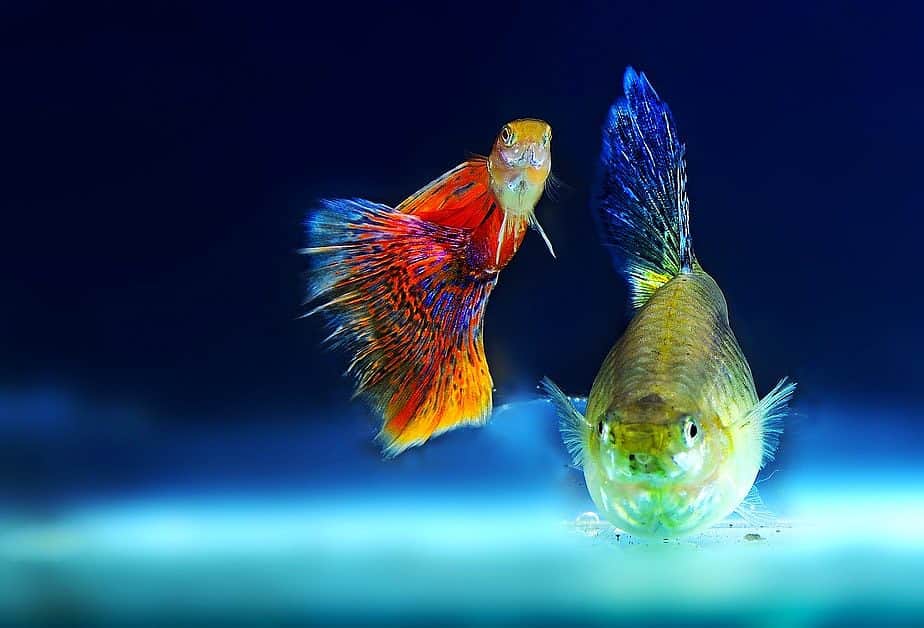
You might wonder if fish get bored in aquariums if you are looking for a low-maintenance pet and prefer to avoid getting a large tank but care about your pet’s well-being. So, do pet fish get bored living in aquariums?
Pet fish can get bored in an aquarium. We know that the brain structures of fish that live in dull, unchanging conditions do not grow at the same rate as fish that live in stimulating environments. Most fish species have a much longer memory than rumor has it, and they appreciate a lively, stimulating environment in their tank.
Although fish need stimuli and experiences to grow and thrive, having specific environmental conditions is the most important factor for its well-being.
Possible Signs of Boredom and Stress in Pet Fish
When we examine pet fish in a home aquarium, it can be challenging to differentiate boredom from general distress due to other factors.
The signs of general distress might be due to either lack of stimulation or bad conditions.
Just like with any other pet, your fish could show signs and symptoms to communicate boredom or stress:
- Changes in appetite are a tell-tale sign of distress. The fish could be stressed if it does not eat its usual food.
- Changes in behavior in general. Lethargy, fast frantic swimming, hanging out near the edge of the aquarium, or plunging into the sediment are common stress behaviors.
- Excessive hiding: most kinds of fish like to hide for rest or intermittently but constant hiding could signal distress.
- Gasping at the surface is a common way to communicate a lack of oxygen but it could be a way to communicate general discomfort.
- Common stress behaviors in community tanks include nipping others’ fins. Boredom is a trigger but it is also common for aquarium fish to act aggressively if the conditions in the tank are suboptimal.
- Changes in physical health or appearance, including the quality of fins or fading colors, could also point to illness or boredom.
Prevent Your Fish From Getting Bored
Functional Decorations Provide Enrichment and Places to Rest and Hide
All fish need some items or plants in the tank, as long as there is ample space for the tank inhabitants to swim around. Items in the tank are there for functional reasons, not just esthetics:
- Decorations provide hiding spots and areas for rest and sleep
- They can also diffuse excessive water movement, from a bubbler, for example.
- Decorations are stimulating for your fish. They do provide an enriching environment for your pet fish and help prevent what we understand as boredom.
In other words, provide objects for your fish in the aquarium but keep them functional. The decorations can be fun to look at but they should also be useful for your pet fish.
Tankmates of the Same or Other Species Are Important for Sociable Fish
The right company is essential to keep your fish healthy, happy, and appropriately entertained.
If you are interested in keeping one species of fish, be sure to follow the recommendations to keep the fish either alone or in a small group, depending on the species. Some fish need to live in schools.
Of course, some fish such as male bettas or male gourami, do better alone.
Prevent overcrowding in the tank: too many fish and insufficient space are among the main stressors for aquarium fish.
If you would like to have a community aquarium with several fish species, do prior research to ensure that the fish can coexist peacefully and thrive in similar conditions.
Observe how the fish interact. You might notice bullies and some fin-nipping behaviors. In that case, it is important to separate the bullies and consider any potential stressors. Some species are prone to nipping others’ fins, even if everything is well in their environment.
Keep Appropriate Male-To-Female Ratios
Most female fish of the same species can live together but a couple or more males could fight each other. If you want to keep both male and female fish, it is usually best to keep one male with 2-5 females, although there are variations from species to species.
Some fish, most notably male Bettas, prefer to live alone, as long as the conditions in the tank are good. They do not need a company to entertain them but may respond well to interacting with the owner in some ways.
Interact With Your Fish
Not all fish are particularly interactive but some are thought to recognize the owner and can do behaviors, or tricks. Bettas are definitely among the smartest, most interactive, species.
- Some owners figure out a way to make their fish swim through a little hoop, using treats.
- Others use a mirror for the fish to see themselves and respond by flaring their fins and tails. This should not be done often because it could be very stressful for fish.
- Many fish respond well when the owner doodles on the aquarium glass. Use a washable marker. Your fish might enjoy watching you draw patterns in different colors every time.
Fish do not hear when you talk to them but perceive the vibration and may recognize the vibrations associated with your presence over time.
Although it can be difficult to pinpoint the cause of changes, with fish being harder to read than our fluffy pets, a lack of a stimulating environment is a factor to consider.
Maintain Optimal Tank Conditions
Optimal conditions vary depending on the fish species but they are essential for the well-being of your pet fish.
Whether you would like to host only one kind of fish or a couple of compatible fish species, you will need to do some research to consider the core aspects of the environment in your aquarium:
- Appropriate space for the number of fish specimens
- Temperature – most fish, but not all, do need a tank warmer
- Acidity, more alkaline or more acidic
- Hardness, or mineral composition
- Movement or stillness or water most fish do better with either still or slowly moving water
- Proper filtration and regular partial changes of water ensure that toxins are removed but the bacterial composition is stable
If you are a beginner and prefer easy fish that do not need much space or equipment, read our post on low-maintenance fish that do not need much equipment in the tank.
Related Questions:
Do Pet Fish Need Decorations?
Fish need decorations because they like to explore their environment and have hideout spots for rest. Avoid putting too many decorations because they need space, too. The items should be safe for the fish, so without any sharp edges, and made of non-toxic materials. Artificial decorations are generally better than natural ones for novice fish owners because they are easier to maintain.
Recent Posts
Guinea pigs have excellent hearing, especially at high frequencies. They are more sensitive to high-pitched sounds than people. These pets should not be exposed to sounds loud enough that you would...
Guppy fish Dwarf gourami Choosing the right tank mates is so important for a peaceful community aquarium. Can guppies and dwarf gouramis live in one tank? Dwarf gourami and guppies can live...

